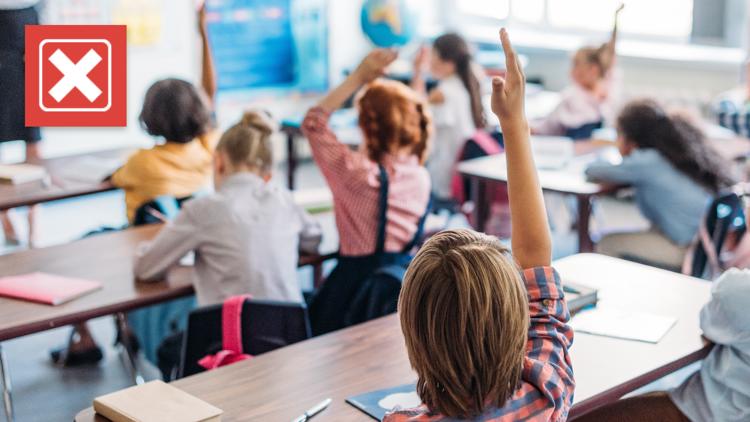Editor's note: This story has been updated to include a report on the estimated financial impact of Amendment 2 provided by Winning for Missouri Education.
Missourians heading to the polls during this general election cycle will vote on Amendment 2, which would legalize sports betting on college and professional games in the state.
Missouri would join 38 states that have legalized sports betting in some form if voters in the state approve Amendment 2.
As Election Day draws closer, ad spending from groups both for and against Amendment 2 has ramped up.
Winning for Missouri Education, the group behind Amendment 2, claims in its ads that the measure would generate tens of millions of dollars annually, or $100 million over the next five years, for schools in the state. Opponents of the amendment say there’s no guarantee that would happen.
VERIFY has received many questions from readers who are confused about what Amendment 2 does and want to know whether it guarantees millions of dollars for schools in the state each year.
THE QUESTION
Does Missouri’s Amendment 2 guarantee millions of dollars of revenue for schools each year?
THE SOURCES
- Missouri Amendment 2 text
- Missouri State Auditor’s Office Fiscal Note published in October 2023
- Peverill Squire, Ph.D., a professor of political science at the University of Missouri
- Report from Eilers & Krejcik Gaming commissioned by Winning for Missouri Education, the group behind Amendment 2
THE ANSWER
No, Missouri’s Amendment 2 does not guarantee millions of dollars of revenue for schools each year. There’s a wide range of how much money the amendment could bring in for schools.
WHAT WE FOUND
If Amendment 2 passes, sports betting would be legal in the state of Missouri and operators would have to pay a one-time license fee and a renewal fee after five years, as well as a 10% tax on betting revenue.
The amendment says some revenue from that tax will be allocated to schools. However, there’s no guarantee about how much revenue the tax and licensing fees from legalized sports betting will generate in the state, and not all of it is required to go to education.
“There’s no guarantee that any money will necessarily flow in [to schools] or certainly very much money,” Peverill Squire, Ph.D., a professor of political science at the University of Missouri, told VERIFY.
Missouri state government entities estimate a wide range in possible tax revenue collected each year if sports betting is legalized, according to a summary of a fiscal note issued by the state auditor’s office in October 2023.
“Because the proposal allows for deductions against sports gaming revenues, they estimate unknown tax revenue ranging from $0 to $28.9 million annually,” the fiscal note summary says.
Winning for Missouri Education, the group backing the amendment, commissioned a report from a research firm called Eilers & Krejcik Gaming. That report argues the government’s revenue estimates are too low and projects that the state could see more than $100 million for education in the first five years that Amendment 2 is in effect.
But these are all estimates. Actual fee and tax revenues from sports betting will depend on how many operators participate, how many people place bets and how profitable the betting operators are.
Here’s what the text of Amendment 2 says about tax revenue:
“A wagering tax of 10% is imposed on the adjusted gross revenue received from sports wagering conducted by each licensee and each sports wagering operator acting on behalf of a licensee.
The annual revenues received from such tax shall be appropriated for institutions of elementary, secondary, and higher education in this state: provided, however, that an appropriation to such educational institutions shall be made only after such annual wagering tax revenues are appropriated as follows:
(1) to reimburse the reasonable expenses incurred by the Commission to regulate sports wagering in the state to the extent that the Commission has not been fully reimbursed for such expenses from the sports wagering fees collected by the state; and
(2) the greater of 10% of such annual tax revenues or $5,000,000 to the Compulsive Gaming Fund.”
Based on the amendment’s language, it appears as though tax revenues have to cover costs and fill the Compulsive Gaming Fund before they can be allocated to education.
The Eilers & Krejcik Gaming report argues that estimated revenue from licensing fees would cover the state Gaming Commission’s expenses and the necessary contribution to the Compulsive Gaming Prevention Fund. According to the report, that means any tax revenue the state receives would automatically go toward education.
But the fiscal note from the state auditor’s office leaves room for doubt. Licensing fees are not paid every year and the fiscal note estimates that in “years where the Commission does not collect renewal fees, licensing fees will be insufficient to meet the Commission’s reasonable expenses and would thus require the Commission to rely upon tax funds that would otherwise be appropriated to education in the state of Missouri.”
In other words, there will likely be less tax revenue left over to be allocated to schools in years that the commission does not collect licensing or renewal fees.
Some ads also claim the money from sports betting would lead to increased pay for teachers, but Amendment 2 does not specify where the money for educational institutions has to go.



